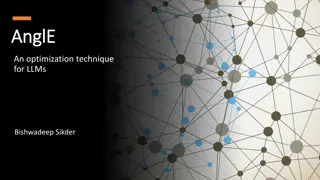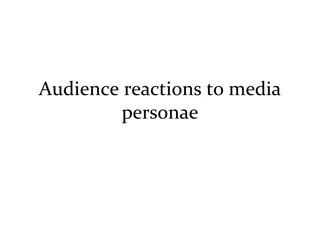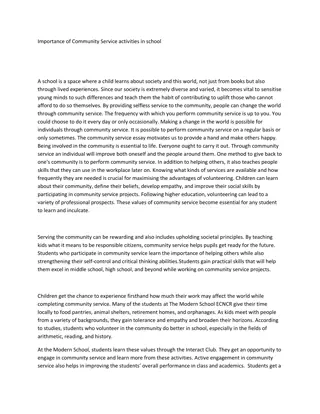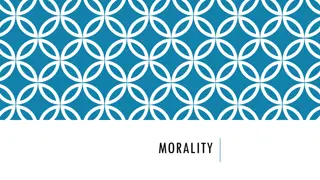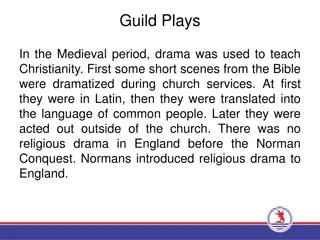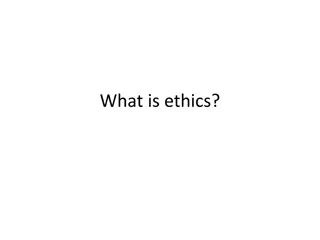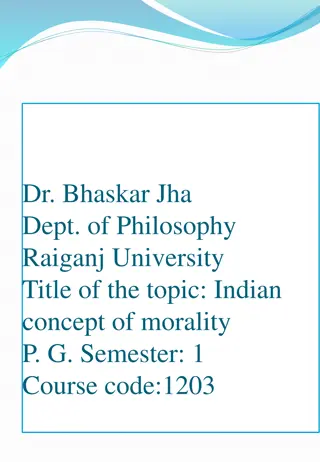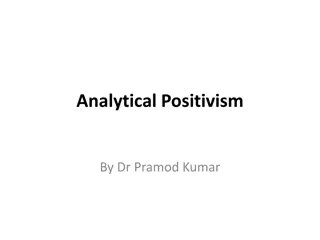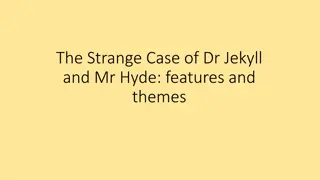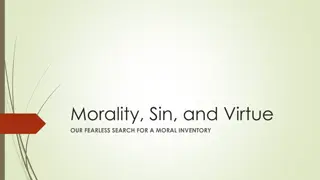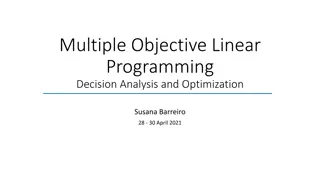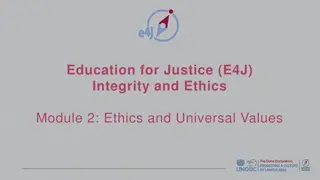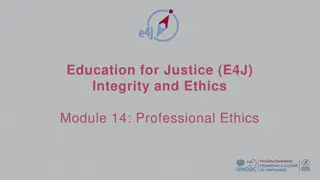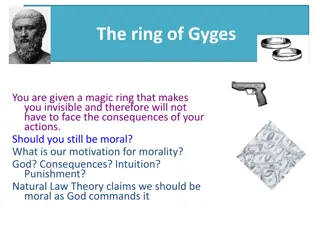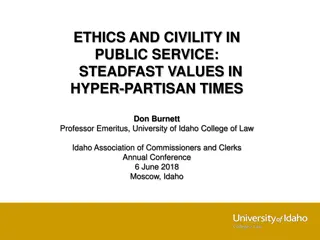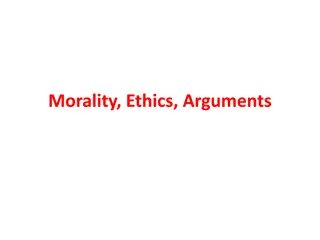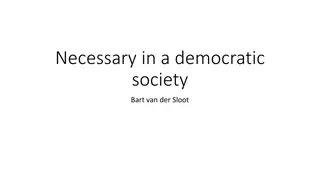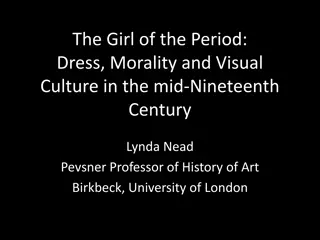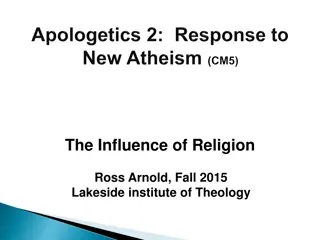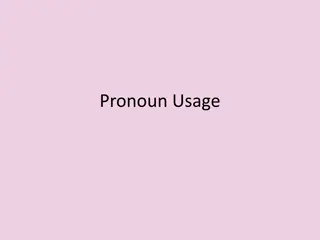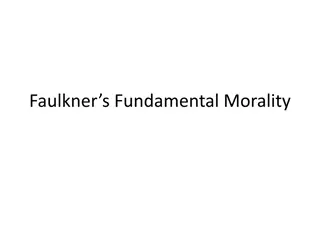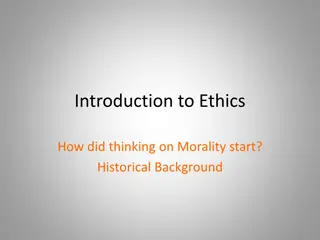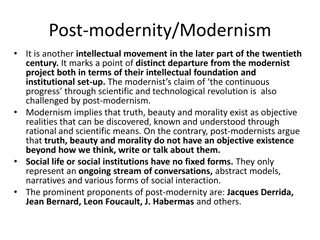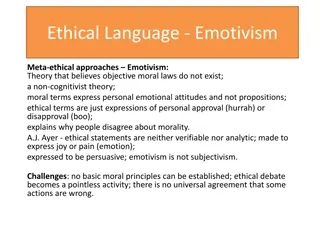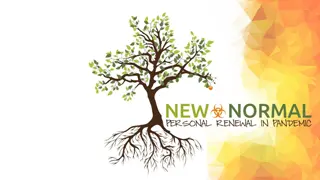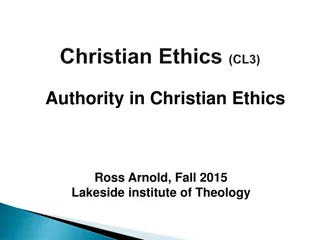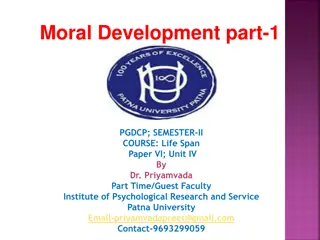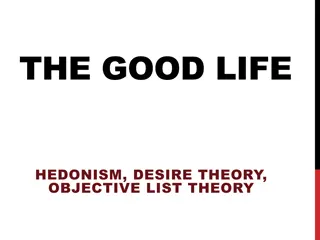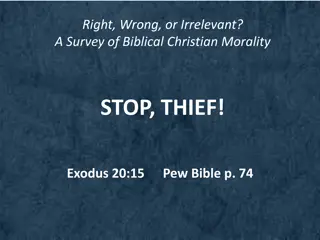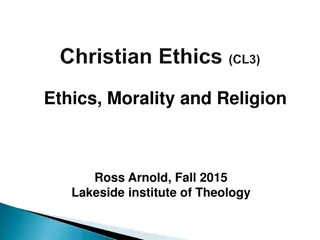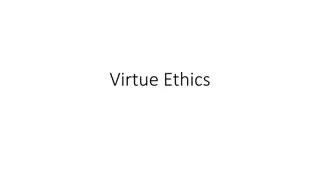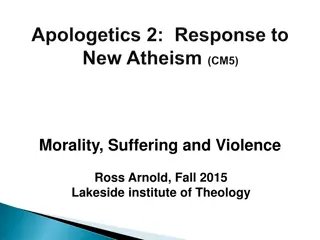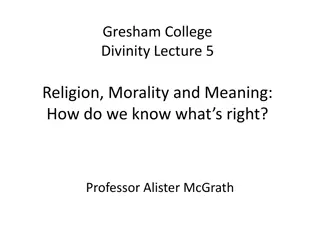AnglE: An Optimization Technique for LLMs by Bishwadeep Sikder
The AnglE model introduces angle optimization to address common challenges like vanishing gradients and underutilization of supervised negatives in Large Language Models (LLMs). By enhancing the gradient and optimization processes, this novel approach improves text embedding learning effectiveness.
9 views • 33 slides
Understanding Relativism and its Impact on Critical Thinking
Relativism poses a challenge to critical thinking by asserting that truth is subjective and varies from person to person or society to society. While some forms of relativism, like relativity, can be rational, global relativism faces self-referential inconsistency. Values relativism is commonly appl
0 views • 25 slides
Understanding Audience Reactions to Media Personae
Audience reactions to media personae vary based on factors such as perceived realism, suspension of disbelief, character personality, and viewer affinity. This analysis explores how audience members engage with characters in media, evaluating morality, admiration, and perspective within the portraye
3 views • 49 slides
KONSEP DASAR ETIKA, NILAI, DAN MORAL
Exploring the fundamental principles of ethics, values, and morals, this content delves into the definitions of law, etiquette, and morality. It discusses the importance and objectives of ethics in regulating human behavior and society, along with key principles such as beauty, justice, equality, li
1 views • 11 slides
The Modern School ECNCR- Best CBSE School in Delhi
The Modern School ECNCR is the best school in Delhi nurturing future leaders by inculcating values like tolerance, honesty, leadership, compassion, and morality.
0 views • 2 slides
Understanding Morality and Its Influences in Human Life
Morality is a fundamental aspect of human existence, shaping behavior based on cultural, religious, and philosophical beliefs. It provides a system for discerning right from wrong and fosters virtues like compassion and justice. This set of rules and principles guides individuals in making sound mor
0 views • 30 slides
Medieval Drama: Guild Plays and Moral Lessons
Learn about the evolution of medieval drama in England, from religious guild plays to morality plays and interludes. Guild plays, including mystery and miracle plays, were performed by craft guilds to teach Christianity through biblical stories. Morality plays like "Everyman" aimed to impart moral l
3 views • 9 slides
Understanding Ethics: The Study of Morality and Human Actions
Ethics, derived from the Greek word ethos, explores the principles that guide human behavior, relationships, and moral judgments. It delves into what is right or wrong, good or bad, just or unjust, aiming to provide a framework for ethical conduct in society. With a focus on moral philosophy, ethics
5 views • 32 slides
Exploring the Indian Concept of Morality in Philosophy
Delve into the intricate discussions surrounding morality in Indian philosophy, exploring the distinctions made between what is and what ought to be. Compare Western and Indian perspectives on morality and examine key criteria proposed by philosophers like Kurt Baier and Frankena. Discover how India
4 views • 20 slides
Overview of Analytical Positivism in Legal Theory
The Analytical Positivism school, also known as the Austinian school, emphasizes a sharp separation between law and morality. It views law as a command and emphasizes the importance of law as it is, rather than how it ought to be. This approach, championed by thinkers like John Austin and Jeremy Ben
0 views • 19 slides
Exploring the Themes and Symbolism in Dr. Jekyll and Mr. Hyde
In "The Strange Case of Dr. Jekyll and Mr. Hyde," Robert Louis Stevenson delves into the duality of human nature through the transformation of Dr. Jekyll into Mr. Hyde. This novella portrays the hidden dark side within individuals and explores the moral dichotomy of humanity. Themes such as appearan
0 views • 7 slides
Exploring Morality, Sin, and Virtue: A Journey of Self-Discovery
Dive into the profound exploration of morality, sin, and virtue, uncovering the essence of self-reflection and ethical understanding. From delving into the definitions of these concepts to understanding the nature of sin and virtue, embark on a transformative path towards enlightenment and inner gro
1 views • 22 slides
Multiple Objective Linear Programming: Decision Analysis and Optimization
Explore the complexities of multiple objective linear programming, decision-making with multiple objectives, goal programming, and evolutionary multi-objective optimization. Discover the trade-offs and conflicts between various objectives in optimization problems.
6 views • 84 slides
Understanding Ethics, Values, and Universal Morality
Explore the concepts of ethics, universal values, and morality in a multicultural context through Education for Justice (E4J) Integrity and Ethics Module 2. Delve into topics such as the Universal Declaration on Human Rights, enacting universal values, moral relativism, and more. Gain insights on th
6 views • 14 slides
Understanding Professional Ethics in Career Development
This educational module delves into personal, theoretical, and professional ethics, exploring potential conflicts between role morality and personal morality. Students will gain insights on applying ethical principles in their careers, understanding the role of professional codes of ethics, and reso
0 views • 9 slides
Understanding Natural Law Theory: Morality and Divine Commands
Natural Law Theory, influenced by thinkers like St. Thomas Aquinas and Aristotle, posits that morality is derived from rational thought and divine commands. The theory emphasizes the importance of following moral absolutes to establish a right relationship with God and achieve eternal life. By study
1 views • 36 slides
Understanding Optimization Techniques for Design Problems
Explore the basic components of optimization problems, such as objective functions, constraints, and global vs. local optima. Learn about single vs. multiple objective functions and constrained vs. unconstrained optimization problems. Dive into the statement of optimization problems and the concept
0 views • 96 slides
Ethics and Civility in Public Service: Upholding Steadfast Values
In a hyper-partisan world, Don Burnett emphasizes the importance of ethics, morality, and civility in public service. He delves into the foundation of trust, shared ethical values, and the elements of the rule of law that are essential for a well-functioning government. The connection between ethics
1 views • 26 slides
Understanding Morality, Ethics, and Arguments in Philosophy
Morality and ethics are interconnected concepts that delve into the principles of right and wrong conduct. They involve disciplined reflection on human moral intuitions and choices. Valid and invalid moral arguments exemplify the importance of drawing evaluative conclusions from facts. Various ethic
0 views • 9 slides
Necessity Test in a Democratic Society: Balancing Public vs Private Interests
The necessity test in a democratic society involves balancing public interests such as security, morality, and environment against private interests. The test determines whether an infringement is necessary and legitimate, or unnecessary and a violation. Different categories like security-related ca
0 views • 36 slides
The Girl of the Period: Dress, Morality and Visual Culture in the mid-Nineteenth Century
Explore the intersection of dress, morality, and visual culture in the mid-nineteenth century through the lens of Lynda Nead's work. Delve into the societal expectations and perceptions surrounding women's fashion and behavior during this era, shedding light on the complex dynamics at play.
0 views • 27 slides
Exploring the Clash Between New Atheism and Biblical Morality
The clash between New Atheists and biblical morality is highlighted in their differing views on ethics, justice, and religious teachings. Christopher Hitchens and Richard Dawkins express skepticism towards biblical moral codes, while advocating for a secular set of ethical principles. The debate enc
0 views • 10 slides
Metaheuristics and Hybrid Approaches in Multi-Objective Optimization
Multi-objective optimization involves solving complex problems with conflicting objectives, such as minimizing makespan and tardiness in flow shop scheduling. Pareto Optimal Solutions are sought, where improving one objective cannot be done without worsening another. Metaheuristics like S and P meth
0 views • 11 slides
Understanding Pronoun Case: Nominative and Objective Pronouns
We have covered all pronouns in the slide show but still need to discuss pronoun case. Personal pronouns have nominative and objective cases. Nominative pronouns like "I" are used as subjects, while objective pronouns like "me" are used as objects. Learn how to use them correctly in sentences with e
0 views • 11 slides
Faulkner's Fundamental Morality: A Deep Dive into the Construction of Morality in Faulkner's Works
In an exploration of Faulkner's narrative innovations, this analysis delves into the intricate layers of his works, focusing on the foundational aspects of beauty and love in the construction of morality. Through multiple narrators and stream of consciousness writing, Faulkner presents a challenging
0 views • 22 slides
Exploring the Origins and Diverse Perspectives on Morality
Explore the historical foundations of morality, from Plato's Ring of Gyges to Cultural Relativism, questioning the basis of ethical behavior and societal norms over time. Delve into philosophical debates that challenge our understanding of right and wrong, highlighting the complexities of moral reas
0 views • 17 slides
Understanding Post-Modernity versus Modernism
Post-modernity challenges the foundational ideals of modernism, rejecting the notion of objective truth, beauty, and morality in favor of a more fluid and subjective view. Post-modernism emphasizes the pervasiveness of power dynamics in social structures, critiques grand narratives and ideologies, a
0 views • 7 slides
Understanding Emotivism: A Non-Cognitivist Theory in Ethics
Emotivism is a meta-ethical theory that posits the absence of objective moral laws, suggesting moral terms express personal emotional attitudes rather than propositions. Influenced by philosophers like A.J. Ayer and Hume, it challenges the existence of basic moral principles and universal agreement
0 views • 23 slides
Morality in UK Drug Policy: Policy Constellations Analysis
Morality plays a significant role in shaping drug policy in the UK, as revealed by the research conducted by Professor Alex Stevens at the University of Kent. The study investigates the moral commitments underlying different policy positions in UK drug policy debates, highlighting five ethico-politi
0 views • 19 slides
Reflections on Faith, Morality, and Human Nature
The passage from 2 Chronicles emphasizes the importance of humility, prayer, and seeking forgiveness to heal the land. Dr. JD Unwin's research highlights the impact of sexual fidelity on society's success. The staggering statistics on porn consumption within Christian communities raise questions abo
0 views • 17 slides
Understanding Christian Ethics: Sources of Authority and Interpretation of Scripture
Christian ethics explores the proper course of action for humanity, addressing questions of morality, good versus evil, and right versus wrong. This study delves into the roots of authority in Christian ethics and the interpretation of Scripture, examining the Old and New Testaments as foundations f
0 views • 15 slides
Morality and Ethics in Contemporary Society
The discussion explores the societal perception of morally acceptable behaviors, ethical dilemmas, and the erosion of foundational values in the context of religion, morality, and human identity. It addresses issues such as gambling, cohabitation, sexuality, and the impact of rejecting traditional v
0 views • 40 slides
Understanding Moral Development: Key Aspects and Components
Moral development is a crucial aspect of human growth that encompasses the understanding of morality from infancy to adulthood. It involves learning what is right and wrong, along with developing a sense of duty and ethical behavior. This process is influenced by various factors like beliefs, emotio
0 views • 9 slides
Exploring The Good Life: Hedonism, Desire Theory, and Objective List Theory
Delve into the concepts of Hedonism, Desire Theory, and Objective List Theory to understand what constitutes a good life and the pursuit of well-being. Explore different value theories, the debate between subjective and objective values, and the philosophical perspectives on happiness and pleasure.
0 views • 60 slides
Understanding the Differences Between Objective and Projective Tests
Objective tests aim to maximize objectivity by providing structured response options, while projective tests delve into hidden emotions and conflicts through ambiguous stimuli. Pros of objective tests include standardization and reliability, but projective tests offer unique insights based on indivi
0 views • 10 slides
Biblical Insights on Stealing and Morality
Explore the biblical perspective on stealing, emphasizing the commandment against theft and the broader implications of stealing from God. Various biblical verses are highlighted to convey the message that stealing is not only about material possessions but also encompasses spiritual aspects. The ar
0 views • 26 slides
Exploring Ethics, Morality, and Religion: A Philosophical Journey
Delve into the intricate realm of ethics, morality, and religion as they intersect in human decision-making. Uncover the fundamental questions of right and wrong, good and evil, and the role of religious beliefs in ethical considerations. Explore ancient and modern perspectives on ethics, from agent
0 views • 9 slides
Insights into Virtue Ethics and Critiques of Kantian Morality by Philippa Foot
Philippa Foot, a key figure in the modern revival of Aristotle's virtue ethics, critiques the Kantian approach to morality. She emphasizes the importance of motivation in cultivating virtues, arguing that feeling bound by morality stems from wanting to lead a flourishing life. Through her works, Foo
0 views • 14 slides
The Debate on Objective Morality: The Atheistic Perspective
The discussion delves into the concept of objective morality and its relation to religious beliefs and atheism. It explores why most people believe in objective morality even though atheists argue against its existence based on evolutionary theories. The argument is centered on the existence of a hi
0 views • 13 slides
Perspectives on Science, Morality, and Meaning in Society
Explore various viewpoints on the intersection of science, morality, and meaning in society through the perspectives of notable figures such as Albert Einstein, Sir Peter Medawar, Bertrand Russell, and Alex Rosenberg. Contemplate the implications of scientific knowledge, the limitations of rationali
0 views • 19 slides
